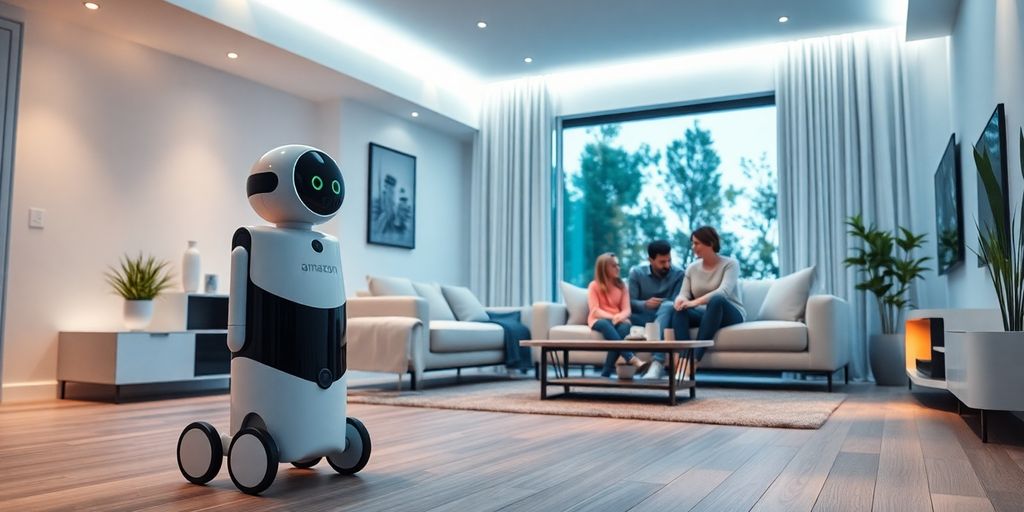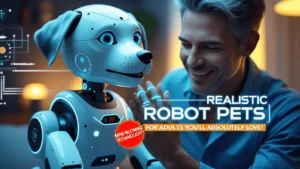So, Amazon’s got this new robot called Astro, and it’s stirring up quite the buzz. Imagine a little gadget rolling around your house, keeping an eye on things. Sounds cool, right? But, as with anything that has cameras and microphones, there are some privacy concerns. While Amazon says it’s all about security, folks are wondering if it’s just a cute spy in disguise. Let’s dive into what makes Astro tick and why it’s got people talking.
Key Takeaways
- Amazon Astro is a home robot designed to enhance security with AI and facial recognition.
- There are significant privacy concerns due to its ability to record and store data.
- Astro’s navigation in real homes might face challenges with obstacles like stairs and clutter.
- Public opinion is mixed, with some seeing it as innovative while others worry about surveillance.
- The cost of Astro is high, and its value compared to traditional systems is debated.
Amazon Astro: The New Face Of Home Security

Revolutionizing Surveillance
Imagine a home robot that not only looks cute but also watches over your house. That’s the Amazon Astro home security robot for you. This clever little device rolls around, keeping an eye on things, and even recognizes faces. It’s like having a security guard that doubles as a pet. It’s got a 12-megapixel camera on a telescoping pole, letting it see at eye level. Astro can patrol your home, checking for motion, and it will follow any unrecognized faces, capturing video and audio. It’s a security robot that brings a new level of indoor surveillance.
The Role Of AI In Monitoring
Astro isn’t just about hardware; it’s packed with AI smarts. It uses face recognition to know who’s who in your house. If it spots someone it doesn’t know, it can follow them around, recording everything. This Amazon Astro room monitoring system integrates with Amazon’s Ring and Alexa Guard, enhancing its security features. It’s like having a voice-controlled robot assistant that’s always alert.
User Experience And Interaction
Interacting with Astro is like talking to a mobile Alexa device. You can tell it to go to specific rooms or ask it to “hang out” with you. It’s designed to be a smart home companion, bringing a touch of personality with its animated eyes and head movements. Astro can even carry small items around your home. Plus, the Amazon Astro pet mode features make it follow you like a loyal dog. Whether you’re using it for elderly care or just as a fun gadget, Astro offers a unique blend of utility and charm.
Privacy Concerns Surrounding Amazon Astro

Data Collection Practices
Amazon Astro, the autonomous robot designed for home use, raises eyebrows with its data collection capabilities. It’s more than just a cute gadget; it’s a sophisticated surveillance device. Astro captures videos and 3D maps of your home, potentially revealing intimate details like the size of your living space, types of furniture, and even daily routines. The extent of this data collection is staggering, and while Amazon assures users that this information isn’t used for marketing, the potential for future misuse remains a concern.
User Control Over Privacy
Amazon has implemented some features to ease privacy worries. Users can set “out of bounds” zones to restrict where Astro can roam and record. There’s also a “do not disturb” mode, and a button that disables all cameras, microphones, and sensors. However, these measures might not be enough for everyone. The fact that video streams and 3D maps are uploaded to Amazon’s servers, rather than staying on the device, leaves room for skepticism.
Potential Risks Of Surveillance
The risks associated with Astro are not just about privacy invasion but also about the reliability of its surveillance. The robot’s person-detection system has been criticized for being unreliable, which could lead to false alarms or missed detections. Moreover, with Amazon’s history of aggressive data practices, users are right to question how their data might be used in the future. This cute little robot could be a Trojan horse, gathering more data than users are comfortable with, and potentially changing the landscape of home privacy forever.
While Amazon Astro promises to revolutionize home security, it also brings with it significant privacy challenges. Balancing the benefits of a high-tech surveillance system with the need to protect personal data is a tightrope that Astro users must walk.
The Technology Behind Amazon Astro

AI Navigation Capabilities
Amazon Astro is packed with innovative technology, especially when it comes to its navigation capabilities. This Alexa robot uses a combination of sensors and AI to move around your home. It employs infrared light and ultrasound to measure distances and detect obstacles, ensuring it doesn’t bump into furniture or walls. Despite its advanced system, Astro struggles with certain real-life scenarios, like navigating over thick carpets or handling stairs. Its ability to autonomously navigate a typical home environment is a major selling point, but it might not yet be perfect for every household.
Face Recognition Features
Astro’s face recognition is another standout feature. It uses Amazon’s Rekognition technology, which is capable of identifying faces and objects. This allows the robot to recognize family members and even follow them around the house if needed. While this can be seen as a convenience, it also raises privacy questions, especially regarding how this data is stored and used by Amazon. The company claims that face recognition data is stored locally on the device, not in the cloud, which might ease some privacy concerns.
Integration With Other Amazon Devices
Astro doesn’t work alone; it integrates seamlessly with other Amazon devices. Whether it’s syncing with your Echo for voice commands or using your Amazon Photos account to store images, Astro is designed to fit into the existing Amazon ecosystem. This integration allows for a more cohesive smart home experience, making it easier for users to manage their devices through a single interface. However, this also means that users become more embedded in Amazon’s product ecosystem, potentially raising concerns about data privacy and control.
The Amazon Astro is not just a gadget; it’s a glimpse into a future where home robots could become as common as smartphones. While it has its quirks and limitations, its potential to change how we interact with technology in our homes is undeniable.
Consumer Reactions To Amazon Astro

Public Perception Of Surveillance
Amazon’s Astro has stirred up quite the conversation. Some folks think it’s just another gadget, while others see it as a step too far into the realm of home surveillance. People are wary about having a robot with cameras and microphones rolling around their homes. Is it just a cute little helper or a potential spy? That’s the question on everyone’s mind. The idea of a robot tracking who’s in your house and what they’re doing makes some people uncomfortable, to say the least.
Concerns Over Reliability
When it comes to reliability, opinions are mixed. Sure, Astro might navigate smoothly in Amazon’s flashy demo videos, but real-life homes are a different story. Think about toys scattered on the floor, thick rugs, and stairs. These are real challenges that Astro might not handle so well. There’s also talk about its face recognition tech not being all that reliable, sometimes struggling to tell people apart. Plus, if it can’t even manage a simple staircase, how reliable is it really?
The Cuteness Factor
Astro’s design is undeniably charming, with its big, animated eyes and pet-like demeanor. This cuteness is a double-edged sword. On one hand, it makes the robot more approachable and less intimidating, which might help it fit in as a household companion. On the other hand, some people worry that this cuteness is just a distraction from its true purpose as a surveillance device. It’s like having a pet that can report back to Amazon. The cuteness might win some people over, but it’s not enough to erase all concerns.
Comparing Amazon Astro To Traditional Security Systems
Advantages Of Robotic Surveillance
Amazon Astro, the home monitoring system, is not your typical security setup. Unlike traditional systems, Astro offers mobility and a certain charm with its pet-like presence. Here are some benefits:
- Mobility: Astro roams around the house, unlike fixed cameras that only cover specific areas. This means it can potentially spot unusual activities anywhere in the home.
- Integration: It works seamlessly with other Amazon devices, like the Ring doorbell, enhancing its functionality beyond just surveillance.
- User-Friendly: Astro’s design and interface are meant to be intuitive, making it easier for non-tech-savvy users to operate.
Limitations Of Conventional Systems
Traditional security systems have been around for ages, and while reliable, they come with their own set of drawbacks:
- Static Coverage: Fixed cameras can’t move, which means they can’t adapt to changing situations in real time.
- Limited Interaction: Most conventional systems lack the interactive features that Astro provides, like following you or responding to voice commands.
- Complex Setup: Setting up traditional systems often requires professional installation, which can be costly and time-consuming.
Cost Analysis And Value
When considering costs, both initial investment and long-term value are important. Here’s a quick comparison:
| Feature | Amazon Astro | Traditional Systems |
|---|---|---|
| Initial Cost | High | Variable |
| Installation | Easy | Often Professional |
| Mobility | Yes | No |
| Integration With Smart Devices | Yes | Limited |
While Amazon Astro might seem pricey at first glance, its integration capabilities and mobility offer a unique value proposition that traditional systems struggle to match. In the long run, the convenience and expanded features could justify the investment for those seeking a versatile home monitoring system.
Future Implications Of Amazon Astro In Homes
Potential For Mainstream Adoption
Astro could really shake things up in the world of home tech. It’s got the potential to become a must-have gadget, especially if people start seeing it as more than just a fancy toy. Imagine this little robot rolling around your house, keeping an eye on things and maybe even becoming a part of the family. But for Astro to go big, Amazon needs to nail the balance between cool features and privacy concerns. People need to trust that their data is safe. If they get it right, we might see Astro in homes everywhere.
Impact On Home Automation
Astro isn’t just a cute face on wheels; it’s a part of a bigger picture of smart homes. With its ability to navigate homes and interact with other devices, Astro could be a game-changer. Think about it: a robot that not only keeps your home secure but also helps manage your smart lights, thermostat, and more. It could become the hub of a fully automated home, making life easier and more efficient. However, the real challenge is ensuring all these devices work together seamlessly, without any hiccups.
Long-Term Privacy Considerations
Privacy is a big deal when it comes to devices like Astro. While Amazon has put measures in place to protect user data, there are still concerns about what happens in the long run. Will Astro keep your data private, or will it end up being another tool for surveillance? Users need to have control over what data is collected and how it’s used. It’s crucial for Amazon to be transparent and give users the power to manage their privacy settings effectively. If not, the cute little robot might end up being more of a worry than a helper.
As Astro finds its place in more homes, the conversation about privacy and security will only grow louder. Balancing innovation with user trust will be key to its success.
The Marketing Strategy Behind Amazon Astro
Positioning As A Household Companion
Amazon Astro is cleverly marketed as more than just a gadget—it’s a smart display and indoor security camera with a personality. This little robot is designed to be a friendly presence in your home, with its animated eyes and pet-like demeanor. Astro’s charm is its main selling point, making it more than just a functional device. It’s not just about security; it’s about having a new kind of companion that rolls around your house, providing both utility and a sense of companionship.
Target Audience And Demographics
Astro is aimed at tech-savvy homeowners who appreciate the blend of technology and daily life. Families, tech enthusiasts, and even pet lovers are part of the demographic Amazon is targeting. The robot’s ability to integrate with other Amazon devices makes it appealing to those already in the Amazon ecosystem. It’s also marketed towards individuals who value security but want it in a more interactive, engaging form.
Advertising Tactics
Amazon uses a mix of traditional and digital marketing to promote Astro. They highlight its unique features and personality in promotional videos, showing it navigating through homes, interacting with family members, and even avoiding obstacles. These ads often focus on Astro’s ability to fit seamlessly into everyday life, emphasizing its role as a helper and companion. Amazon’s strategy also includes leveraging social media influencers and tech reviewers to build buzz and credibility around Astro. This multi-faceted approach ensures that Astro reaches a wide audience, creating intrigue and desire among potential buyers.
Conclusion
So, there you have it. Amazon’s Astro is shaking things up in the home security world, but not without raising a few eyebrows. It’s like having a little robot buddy rolling around, keeping an eye on things, but at what cost? Sure, it’s got some neat features, but the privacy concerns are hard to ignore. With its cute design, it might win over some folks, but others are rightfully cautious about what it means for their personal space. Whether Astro becomes a household staple or just another tech experiment remains to be seen. One thing’s for sure, though—it’s got people talking.
Frequently Asked Questions
What is Amazon Astro?
Amazon Astro is a home robot designed to help with security and monitoring tasks. It uses cameras and sensors to move around your home and can recognize people and objects.
How does Amazon Astro ensure privacy?
Amazon Astro has features like ‘out of bounds’ zones and a ‘do not disturb’ setting to help protect your privacy. You can also turn off its cameras and microphones with a button.
Can Amazon Astro recognize faces?
Yes, Amazon Astro can recognize faces. It uses face recognition technology to identify people in your home, helping to distinguish between family members and strangers.
What are some concerns about Amazon Astro?
Some people worry about privacy because Astro can collect a lot of data about your home and who is in it. There are also concerns about its reliability and how well it navigates real homes.
How does Amazon Astro compare to traditional security systems?
Amazon Astro offers more mobility and uses AI to monitor your home, unlike traditional security systems that are often fixed in one place. However, it might face challenges in navigating certain home environments.
What is the cost of Amazon Astro?
The initial price for Amazon Astro is $999.99 for early buyers, but the regular price is expected to be $1,449.99.



